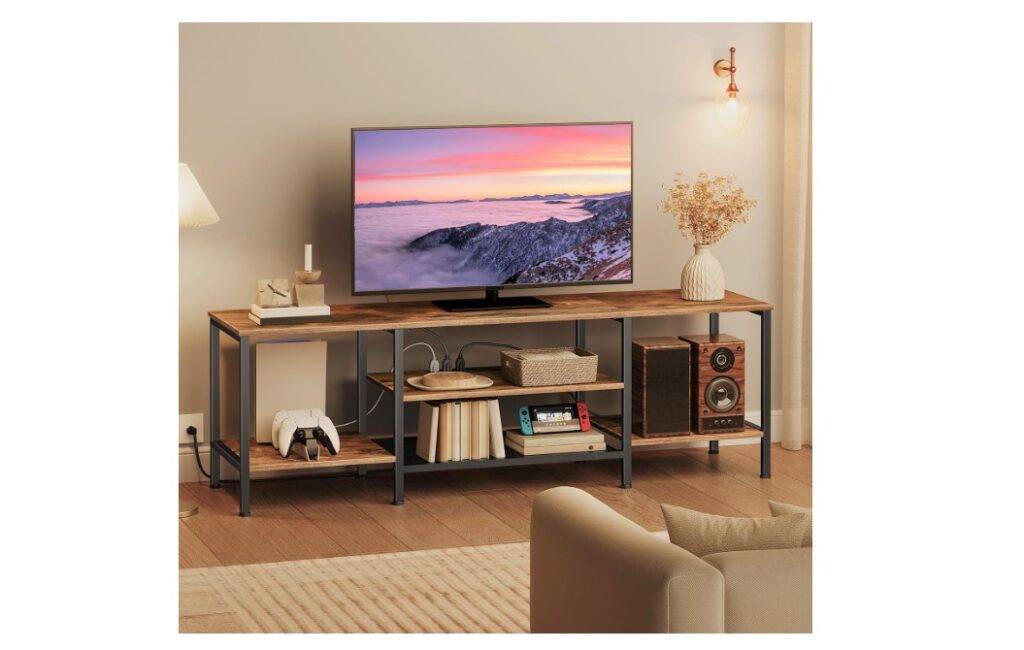20 functional living room layouts for all homes
Designing a functional living room is often a major challenge for many homeowners and renters. Finding the perfect balance between architectural constraints, family needs and aesthetic preferences can seem complex. However, certain configurations have proven successful in different types of spaces. Discover 20 living room layouts that will transform your living room into a space that is both practical and welcoming, whatever its dimensions or characteristics.

LULUTONG 72.8” Upholstered Modern Sofa, 3 Seater Comfy Couch for Bedroom and Living Room
The perfect layouts for small spaces
1. The compact L-shaped layout
In a small space, the L-shaped arrangement maximizes every square inch while creating a convivial atmosphere. Place a loveseat against one wall and complete with an armchair or a small bench perpendicular to it. This configuration naturally delimits the living room space without cluttering it and allows for fluid circulation. For further optimization, choose furniture with raised legs, which create a feeling of space and make cleaning easier.

Reversible Sleeper Sectional Couch Pull Out Sofa Bed
2. All-in-one arrangement around the television
For studios and small apartments, an entertainment-centered arrangement offers a practical solution. Install a multifunctional TV and TV cabinet that integrates storage and entertainment, and place a convertible sofa facing it. Complete with ottomans or poufs that serve as additional seating and slide under a coffee table when not in use. This configuration instantly transforms your living room into a movie theater while preserving everyday functionality.

Convertible Futon Sofa Bed, 71″ Comfy Loveseat Sleeper Sofa
3. The arrangement along the wall
In particularly narrow spaces, a linear arrangement along a main wall optimizes the available space. Place a compact sofa against the longest wall, flanked by a small side table and a floor lamp. Opposite the sofa, install a low TV cabinet that does not obstruct circulation. This arrangement creates an unobstructed central corridor while maintaining the essential features of a comfortable living room.

Beige Comfy Loveseat Sofa for Small Spaces, Small Sofa with Removable Washable Cover
4. The intimate conversation room
For small spaces where interaction is key, place two armchairs facing each other with a narrow coffee table between them. This configuration encourages conversation while saving considerable space compared to a traditional layout. For more flexibility, opt for swivel armchairs that allow you to easily turn to other points of interest in the room as needed.

Modern Sectional Cloud Sofa with Reading Light & USB Charging Port,4 Seat Chenille Modular Couch
5. The multifunctional modular layout
Invest in modular furniture that can be adapted to different daily activities. A sectional sofa with movable modules allows you to reconfigure the space as needed: living room, reading corner or even an improvised dining area. Complete with easily repositionable nesting tables and storage poufs for maximum flexibility in a minimum of space.

Ideal layouts for medium-sized spaces
6. The convivial U-shape
The U-shape creates a perfect conversation area for medium-sized living rooms. Place a three-seater sofa opposite two armchairs or a small two-seater sofa, with a substantial coffee table in the center. This configuration clearly defines the lounge area while creating a warm atmosphere conducive to family exchanges and welcoming guests in an intimate setting.

7. Dual-function layout with office space
Subtly divide your average living room into two distinct functional areas. Dedicate about two-thirds to the relaxation area with a sofa and armchairs, then delimit an office space in the remaining third with a different rug or a console. This layout allows for the harmonious integration of a workspace without sacrificing the comfort of the main living room, perfectly meeting contemporary teleworking needs.
8. The console-separated configuration

N&V Single Seated Foam Sofa, Armless Floor Sofa, One Piece High Density Foam
To structure a medium-sized open space, use a console or low bookcase as a natural divider. Place it behind a sofa positioned in the center of the room rather than against a wall. This trick creates two distinct areas without blocking light or visual communication, while providing an additional surface for decoration and storage accessible from both sides.
9. Arrangement around a natural focal point
Arrange your furniture around a striking architectural feature such as a fireplace or a large window. Position two sofas or a sofa and two armchairs in an L-shape facing this focal point, rather than centered on the television. This arrangement highlights the architectural assets of your interior while creating a balanced living space where technology does not dominate the layout.

Bean Bag Chair, Lazy Floor Sofa Couch for Adults and Kids, Fireside Chair with Ergonomic Design
10. The balanced asymmetrical layout
Create a dynamic arrangement by playing on controlled asymmetry. Place a large sofa on one side, balanced by two different but complementary armchairs on the other. Complete with an off-center coffee table and side tables of varying heights. This less formal configuration brings character and originality while maintaining visual harmony thanks to unifying elements such as textiles or colors.

Convertible Sectional Sofa Couch, 7 Seat 6 Backs Sofa Set with Storage for Living Room
Solutions for large spaces
11. Multiple interconnected areas
In a large living room, create several distinct but visually connected functional spaces. Define a main conversation area, a more intimate reading corner and possibly a play or media area. Use different rugs to define each area while maintaining consistency through recurring decorative elements. This approach transforms a potentially impersonal space into several convivial islands on a human scale.

12. The central layout with peripheral circulation
For very large living rooms, dare to place all the furniture in the center of the room. Arrange two sofas facing each other, complemented by armchairs at the ends and a generous central coffee table. Leave a corridor of circulation all around this central island. This spectacular configuration creates a sense of intimacy even in a large space and facilitates movement between different parts of the house.

13. The circular conversation layout
In a generous space, a circular or octagonal configuration offers a unique social experience. Arrange four small sofas or eight armchairs in a circle around an imposing round coffee table. This democratic arrangement, where each seat is equal to the others, encourages group interaction and is perfect for large families or people who frequently entertain.

14. The back-to-back dual living room layout
For particularly large spaces, create two separate back-to-back lounges. The first can be oriented towards the television or the fireplace for moments of relaxation, while the second, more formal, will be dedicated to conversations. Separate them with two back-to-back sofas or a double-sided console. This bold approach effectively divides an intimidating space into functional zones on a human scale.

15. Tiered seating for rooms with high ceilings
Make the most of the height of a large living room with a high ceiling by creating a tiered effect. Place a low sofa in the foreground, then slightly higher armchairs, and complete with high-backed chairs or a bench on legs at the back. This vertical layering visually fills the space and creates three-dimensional visual interest while offering different perspectives on the room.
Arrangements for atypical configurations
16. The layout around a through living room
For living rooms that function as a passageway between several rooms, create a central conversation island that does not impede circulation. Place a compact sofa and two armchairs around a round coffee table, leaving clear passageways all around. This configuration transforms the constraint of passage into an asset by creating a welcoming central space that naturally connects the different living areas.

decorative basket for living room
17. The layout for a long living room
The layout of very elongated rectangular spaces breaks up the linearity visually. Create two distinct areas: a main one with a sofa and armchairs arranged perpendicular to the length, and a secondary one such as a reading or games corner at the other end. Use a rug to anchor each area and a vertical element such as a lamp or plant to mark the transition between the spaces.
18. The right configuration for sloping ceilings
For living rooms with sloping ceilings or attics, concentrate the wall units in the highest parts. Place low sofas and armchairs under the lowest sections of the ceiling to create a cozy feeling. This arrangement transforms the architectural constraint into an asset by naturally creating areas of privacy, while maximizing the usable space in the upper parts for bookcases or decorative pieces.
19. The layout around a corner living room

modern television for living room or bedroom
In a corner living room with large windows on two walls, position your sofa diagonally across from the corner. This unexpected layout maximizes the view while creating a dynamic conversation space. Complete with armchairs facing the sofa and a triangular or organic coffee table that matches this configuration. The diagonal arrangement brings movement and originality to a potentially static room. decorating-like-american-influencers-affordable-trends
20. The layout adapted to curved walls
For architectural spaces with curved walls or alcoves, embrace this peculiarity instead of fighting against it. Choose a curved sofa or arrange several small armchairs along the curve of the wall. Complete the look with a round or oval coffee table that echoes the movement. This approach transforms a design challenge into a signature element of your interior, creating a truly unique living room that is perfectly integrated with its architecture.

illuminated television cabinet
Purshasesweb : Whatever your space, these 20 configurations offer adaptable solutions for almost any situation. The key is to create a balance between functionality, comfort and aesthetics that suits your lifestyle. Feel free to combine several of these ideas or adapt them to the specific features of your interior. A successful living room is not one that blindly follows trends, but one that perfectly meets the daily needs of its occupants while expressing their personality.
Smart Meal Planning: Strategies to Simplify Your Cooking Nights





